BERLINALE SPOTLIGHT SHORTS GO ABROAD 2014
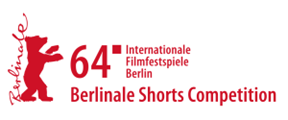
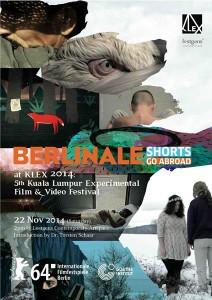
Curated by Maike Mia Höhne
Introduced by Dr. Torsten Schaar in person
A selection of short films of the Berlin International Film Festival 2014 is travelling to Asia as part of the “Berlinale Spotlight” series of events. The Berlinale Spotlight films are uncompromising and complex, and offer an undisguised image of the present. For Berlinale Spotlight curator Maike Mia Höhne, the value of these short films lies in their connection of fiction and reality. They open up space for interpretation and communication, going beyond the events that actually take place.
The Berlin International Film Festival, more commonly known as Berlinale, ranks among the most important film festivals in the world. Movies of all genres, lengths and formats are awarded. Since 2007, the Berlinale Shorts also awards prizes to short films, mostly works of talented young artists. (Goethe Institut Hanoi)
PROGRAMME 1
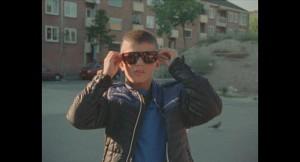
Marc Jacobs (2013)
17:00 min
Sam de Jong, Netherland
Nine year old Soufyane, son of a Moroccan father and Dutch mother, lives in an apartment with his mother and sister in a typical big city high-rise estate. His father, whom he never sees, invites him on a journey. A journey to the country of his ancestors – Morocco. Soufyane is thrilled and prepares for the trip fastidiously, as it is also a kind of initiation. His friends insist that he should get a pair of Ray Ban sunglasses, but Soufyane would rather wear Marc Jacobs. But doesn’t he want to be a soldier, they ask. He remains silent and doesn’t let himself be swayed. Among the various blackmarket dealers in his neighbourhood he eventually finds someone who has the right glasses. Instead of 200 he only has to pay 30, and he’s ready to go. Utilising calm and sober framing, the director gives the amateur actors ample room to explore and express their ideas of manhood and male rituals. Concepts that come up against hard realities in the suburbs. Something that Soufyane also painfully learns, as the sun goes down and he calls after his father.
Born in Amsterdam in 1986, Sam de Jong studied at the Netherlands Film Academy. His graduation film MAGNESIUM premiered at the Sundance Film Festival in 2013, won several international awards and was the Dutch entry for the 2013 Student Oscars.
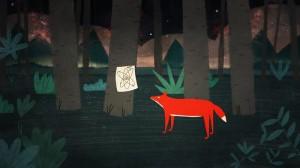
SYMPHONY NO. 42 (2013)
10:00 min
Réka Bucsi, Hungary
Two polar bears sit in deckchairs by the river and fish, a shot is fired. A woman wears a fox as a stole around her neck. She smokes and exhales, everything turns red. Two elderly ladies wait at a zebra crossing where the flow of cars is directed by a traffic light. One of them holds a barking dog on a leash. The other takes a pair of scissors and cuts the leash. The dog runs away. End of story, next shot. A woman mows the lawn in a red bathing suit, lying on the grass in front of her is a dolphin, gasping for air. A recurring location is the forest, that no longer holds the promise of retreat. In 47 images, SYMPHONY NO. 42 tells of a mythical world devoid of morality. The director transfers human emotion and behaviour to animals, she anthropomorphises. Consistently, she also applies this procedure to the interrelationship between humankind and nature. This gives rise to surreal situations that could hardly be more concrete.
Born in Filderstadt in Germany in 1988, Réka Bucsi studied at the Moholy-Nagy University of Art and Design (MOME) in Budapest between 2008 and 2013. In 2011, she participated in the Essemble Digital Training Programme at the Universidade LusoÅLfona de Humanidades Tecnologias in Lisbon. She attended Animation sans FrontieÅLres (ASF) in Viborg, Denmark in 2013.
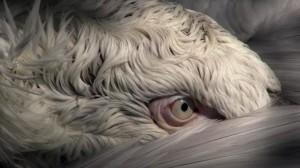
BIRDS (2014)
15:00 min
Ulu Braun, Germany
There it stands, the vulture. Majestically spreading its wings. Holding its position, it scours the open area. The other birds scrutinise their territory as well. Quo vadis, bird? Ulu Braun participated at Berlinale Shorts in 2013 with FORST. His latest film BIRDS looks at the life of birds in urban habitats. They apply their instinctive behaviour to the developed environment. What role do humans play therein? Bags and umbrellas become bushes, buildings become monoliths and people become organisms. The birds are forced to come to terms with a world that they are not responsible for.
Born in Schongau in Bavaria in Germany in 1976, Ulu Braun studied painting and experimental film in Vienna and Helsinki followed by animation at the ‘Konrad Wolf’ University of Film and Television in Potsdam-Babelsberg. His video collages and films are poised on the boundaries between contemporary art and narrative film and have been exhibited in museums and galleries and screened at film festivals. In 2013 his film FORST screened in the Berlinale Shorts section.
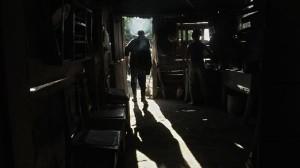
A PARADISE (2013)
14:00 min
Jayisha Patel, Cuba
Director Jayisha Patel travels to the province of Granma, Cuba, named after the yacht with which Fidel Castro, Ernesto Che Guevara and their revolutionaries landed in Cuba in 1956. There, she encounters a young
family who mourn the death of their son, who at merely twelve years of age has comitted suicide. The province is known for its loyalty to the revolution. It is lesser known for the tragic fact concerning the high suicide rate amongst youth. The film depicts the families‘ grieving, who, accompanied by the community, search for affirmation in life.
Born in London in 1987, Jayisha Patel studied economics at the University of Nottingham. Her first short film, GENTLE MEN, won numerous awards. She has worked on documentaries in India, the UK and France, and is currently in her final year at the International Film and Television School of San Antonio de los Banos in Cuba.
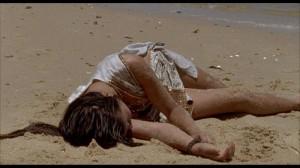
TAPROBANA (2014
24:00 min
Gabriel Abrantes, Portugal/Sri Lanka/Denmark
Taprobana, now known as Sri Lanka, at the end of the 16th century. The largest island in the Indian Ocean is ruled by the Portuguese as a colonial power. An elephant wallows in the water. It heaves and lowers itself pleasurably, its trunk sucked full, snorting. A man relishes a woman. They have sex in the open air. As the man climaxes, the elephant climbs out of the water. The man is Luís Vaz de Camões, Portuguese poet and later, national hero. Now he is still an officer serving the Portuguese crown. Banished from Lisbon, he lives in exile and works on the only thing that matters to him, The Lusiads. In the formal epic based on Homer’s Odyssey, he outlines a journey through time, examining the heroic history of Portuguese conquests. The film is a subjective, comical journey exploring the creative origins of this work. Abrantes draws close to his hero by means of private insights. At the end, Camões stands before the poet’s Olympus and a conversation ensues.
Born in North Carolina, USA, in 1984, Gabriel Abrantes studied at the Cooper Union for the Advancement of Science and Art in New York, at the National School of Fine Arts in Paris and at Le Fresnoy in Tourcoing, France. He has made 15 short films and a feature film and his work has screened at international film festivals including Venice, Locarno and Toronto. His work as a visual artist has been exhibited in Boston, Tokyo and Paris.
PROGRAMME 2:
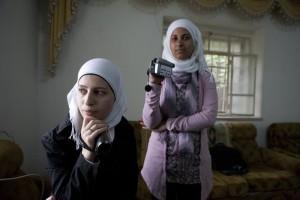
SMILE, AND THE WORLD WILL SMILE BACK (2014)
21:00 min
B´Tselem, Israel/Palestinian Territories
A night like so many nights in Hebron, on the West Bank. A night like so many nights under the occupation. Law permits the Israeli army to enter Palestinian homes at any time. They do not have to say why they search an apartment in the middle of the night. They do not have to explain why they force those present to do what they want. They express their demands with the help of a translator. The others are forced to do what they want. Law permits Palestinians to film these actions and the army is not allowed to forbid it. They are not allowed to take the camera away from them. On this particular night, relations are altered due to the presence of an active camera. It is the family itself who films what happens, establishes a balance amid the imbalance, who is and continues to be involved in the altered relations. In 2011, Yoav Gross was represented in competition at Berlinale Shorts with the film SUSYA, made with colleague Dani Rosenberg.
B’Tselem, the Israeli information centre for human rights in the West Bank, was established in 1989. In 2007, B’Tselem launched its camera project. This provides Palestinians with video cameras so they can document life in the conflict zones and bring the realities of the West Bank to the attention of the Israeli and international community.
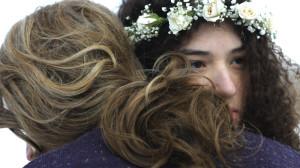
THE WHITE ROSES (2013)
20:00 min
Diogo Costa Amarante, Portugal/USA
A group of people dance at a sports ground to the music of Supertramp. The siblings take flowers to a grave in the deep snow, wearing floral wreaths in their hair. The father directs them. They embrace one another. Memories are invoked by pictures enclosed inside Gabriel’s, the brother’s, amulet. The mother is dead – how will they fill the void she left behind? Each individual family member tries to find their way, is obliged to redefine their course. Calm are the images and gestures that lead us through this film. The colours of night are also the colours of mourning. Mystical imagery and thoughts tangibly resound in the here and now. Who has the stronger powers of recollection – the horse or the elephant? Of the utmost importance however, is the question of how to proceed with the mother inside one’s heart. ‘There are times, when all the world’s asleep, the questions run too deep for such a simple man, won’t you please, please tell me what we’ve learned, I know it sounds absurd, but please tell me who I am.’ (Supertramp)
Born in Porto, Portugal, in 1982, Diogo Costa Amarante graduated in law before making his documentary JUMATE/JUMATE which, along with his short film DOWN HERE, screened at numerous international festivals. In 2009 he participated in the Berlinale Talents. He is currently completing a degree in film at the Tisch School of the Arts in New York.
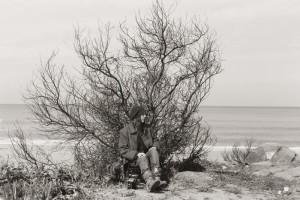
THREE STONES FOR JEAN GENET (2014)
7:00 min
Frieder Schlaich, Germany
There are places of yearning. There are promises that accompany us our entire lives. And there are friends, who listen and ask questions. Frieder Schlaich and Patti Smith are linked by just such a friendship. Tangier is the place, and the promise is one that was made to Jean Genet. Patti Smith has been carrying the secret around with her for many years, inside a matchbox. When chance creates a situation that brings everything together, she is able to honour her promise. Frieder accompanies Patti through the city he feels so close to, and she speaks of that which is close to her. At the cemetery they encounter a young boy who carries the spell of the story further. Two rolls of black and white film, a Bolex and the few minutes before a live performance limit the shooting time. Having the necessary concentration and knowledge of one another is what sets the film apart. The view across the ocean lies in its limitation.
Born in Stuttgart, Germany, in 1961, between 1985 and 1991 Frieder Schlaich studied visual communication at the University of Fine Arts of Hamburg. Then he worked in film and theatre and produced a number of short films and documentaries with Irene von Alberti. His feature film debut PAUL BOWLES – HALF MOON won numerous prizes including the German Film Critics Association Award. As well as producing films for Heinz Emigholz, Werner Schroeter, Christoph Schlingensief and Elfi Mikesch, he also produced Sandra Prechtel’s ROLAND KLICK – THE HEART IS A HUNGRY HUNTER, which screened in the Panorama in 2013.

THE BIG HOUSE (2013)
25:00 min
Juliette Touin, Cuba
A group of heavily pregnant women live in an old mansion on Cuba. Many of them are on their own and very young. Owing to their situation they are given special support. So too 15-year-old Yudi. The relationship with the father of her child is strained, an experience she shares with the other women. And like the others, she too waits for the day of the birth. She waits for what will come and doesn’t know what lies before her. Beyond the usual clichés of Malecón and salsa, here the director encounters young women who are forced to cope with the greatest change in their lives, on their own. Always on the lookout for the child’s father, who is no longer around. Always looking at their belly, that grows and grows.
Born in Seine-et-Marne, France, in 1986, having first studied politics at the Toulouse Institute of Political Science, Juliette Touin subsequently took two masters degrees, one in international journalism and the other in international relations. After working as a journalist in Mexico and Columbia, she studied documentary directing at the Escuela de cine en San Antonio de los Banos (EICTV) in Cuba.
Christoph Girardet was born in Langenhagen, Germany in 1966, he studied at Braunschweig University of Art and has collaborated with Matthias Müller since 1999 in the fields of film, video, installation and photography. He currently lives in Hannover. Matthias Müller was born in Bielefeld, Germany in 1961, he studied at Bielefeld University and Braunschweig University of Art. He currently divides his time between Cologne and Bielefeld. He has worked extensively in the fields of film, video, installation and photography.

WONDER (2013)
8:00 min
Mirai Mizue, Japan/France
Comparable to a colour organ, in which visual effects are produced when a musical key is struck, this film is a journey to the world of cells and structures. Music and sound, sequences of colour and movement, tones and rhythmised oscillations: abstract animation. In order to create the film WONDER, animation artist Mirai Mizue uploaded a one second film, or more specifically, 24 pictures on the Internet every day, on 365 consecutive days. Like a trapeze artist without a safety net, he refrained from using a storyboard and relied solely on his intuition. Along with the orchestral group Pascals, he breathed life into the cells. The direct liaison between painting and film has been an important testing ground for artists since the early days of film history. The most significant representatives of the particularly strong experimental movement of abstract and absolute film in the twenties and thirties, were Walter Ruttmann, Oskar Fischinger and Hans Richter. This work by Mirai Mizue forges an artistic arc to the present day.
Born in Tokyo, Japan, in 1981, Mirai Mizue studied animation at Tama Art University from 2002. His films have screened at major animation festivals including Annecy, Zagreb, Ottawa and Hiroshima. In 2010 he was a member of the selection committee for the Seoul International Cartoon and Animation Festival (SICAF). He also works as an illustrator for a number of Japanese novelists.
Biography:
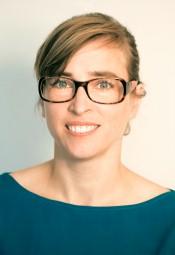
Maike Mia Höhne has curated Berlinale Shorts since the summer of 2007. She was born in Hanover in 1971. Between 1994-1999 she studied visual communication at the Hochschule für Bildende Künste in Hamburg, the Escuela de Bellas Artes in Havanna as well as the Escuela International de Cine y Television in San Antonio de los Baños, Cuba. After working in Buenos Aires, Argentina, she completed her post-graduate studies at the Hochschule für Bildende Künste in Hamburg with a focus on film. Since 2001, she has worked in as a freelance writer, curator, producer, photographer and director in various contexts. Her films are distributed by arsenal experimental and Kurzfilmagentur. She has also been active for many years as a lecturer and moderator at film events. Maike Mia Höhne lives in Hamburg and Berlin.
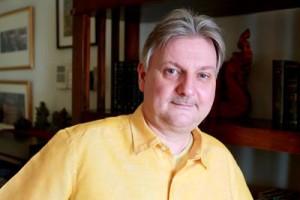
Dr. Torsten Schaar studied German Literature, Linguistics and History at Universities of Rostock and Berlin / Germany. He obtained a PhD in the field of German History specializing in the history of World War II / Hitler Youth. Dr. Schaar worked as a (DAAD/German Academic Exchange Service)-Lecturer for Linguistics, Literature, and German Culture at Silpakorn University / Nakhon Pathom (Thailand), Thammasat University / Bangkok (Thailand), and International Education College (INTEC) / Shah Alam (Malaysia). Dr. Schaar is currently employed as Senior Lecturer for German Studies at University Putra Malaysia. He wrote books and articles on Hitler Youth in World War II, on bombing raids against German towns (1942-1944) and on perceptions of German feature films in Malaysia. Dr. Schaar is also screening curator for German feature films at Kelab Seni Filem Malaysia.
